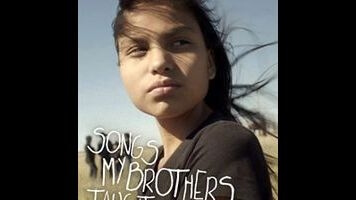Despite its unique setting, Songs My Brothers Taught Me is pretty ordinary

For better and worse, the adjective that best describes Songs My Brothers Taught Me is “unemphatic.” The film premiered in the Dramatic Competition at last year’s Sundance Film Festival, where it won no awards and was generally politely ignored—not because people didn’t like it, but because it lacked any sort of “hook” that would get them talking or excited. In theory, its setting—the Pine Ridge Indian Reservation in South Dakota—should have served that function. But unlike some previous Sundance movies about Native Americans (most notably 1998’s aggressively self-deprecating Smoke Signals), Songs My Brothers Taught Me doesn’t make cultural identity its primary focus… perhaps because its writer-director, Chloé Zhao, was born in Beijing. Instead, it’s a wispy but charming story of two slightly adrift kids who just happen to live on a reservation, and willingly runs the risk of seeming a bit ordinary. Viewers will be torn between admiring its laid-back naturalism and wishing it possessed just a little more oomph.
Casting is always crucial for a movie like this, and Zhao found a couple of talented newcomers at Pine Ridge, building her minimal story in part around their actual lives. Johnny Winters (John Reddy) is a teenager who makes extra money bootlegging liquor, which is illegal on the reservation. His plan is to buy a used truck that will allow him to follow his girlfriend, Aurelia (Taysha Fuller), to Los Angeles, where she’ll soon be starting college. Problem is, that would mean abandoning his 11-year-old sister, JaShaun (JaShaun St. John), who receives little attention from their haunted shell of a mom (Irene Bedard). Neither Johnny nor JaShaun knew their recently deceased father, a rodeo star who apparently impregnated every woman within a 50-mile radius of Pine Ridge—just about every young person in the movie is also named Winters and is their half-sibling. Consequently, JaShaun goes looking for a replacement authority figure, with decidedly mixed results.
Songs My Brothers Taught Me is most compelling at the outset, when its contours are still mostly undefined. Zhao eschews signposting to the point of embracing potential absurdism; an early scene in which a teacher questions his students about what they want to do as adults (Johnny wants to ride bulls, like the father he never knew) has multiple kids in the class holding animals—a huge snake, a baby alligator, a tarantula—but never bothers to explain why, because it’s not relevant to the conversation. Such offbeat details, along with the occasional reservation-specific element (e.g. the “Rez Life” fashion line one minor character sells), linger in the mind much longer than the film’s ostensible narrative, which revolves around the question of whether Johnny will or won’t leave—a decision that’s strongly telegraphed by a local job offer and the sudden appearance of a potential replacement girlfriend. Zhao’s choice to wrap things up with voiceover narration, which she hadn’t used previously, likewise makes the ending feel overly pat and conventional. But her quiet observational acumen is worth cultivating. Add a touch more urgency and vibrancy, and the result could make some serious waves.